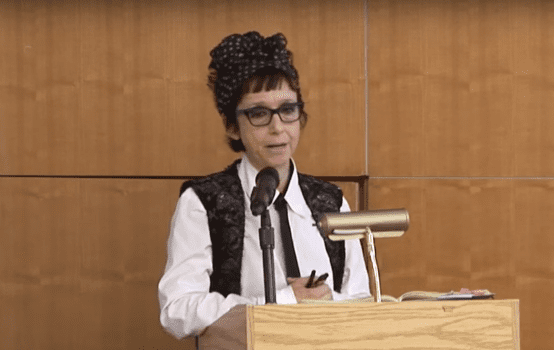Bonfire of the Humanities

Avital Ronell, 66, is a well-known literary theorist and professor at New York University, acclaimed inside the hermetic world of postmodernism.
Born in Prague to an Israeli diplomat, Ronell moved to the United States as a child. She rose to eminence as a protégé of legendary deconstructionist Jacques Derrida. Admirers call her a smart, hilarious, queer, feminist, Jewish anarchist. To others, she exudes in-your-face creepiness and academic opportunism. Ronell has a well-established reputation for terrorizing and power-tripping graduate students.
NYU recently determined that Ronell had sexually harassed graduate student Nimrod Reitman, 34, an Israeli-born gay male, now a visiting fellow at Harvard and married to a man. It’s an unusual incident of a powerful academic woman abusing a younger man.
An 11-month Title IX investigation at NYU recently found that Ronell’s behavior was “sufficiently pervasive to alter the terms and conditions of Mr. Reitman’s learning environment.” Those who know the situation agree that Ronell was way out of bounds, as reports in The New York Times and elsewhere now confirm. Yet instead of stripping her of her tenure, as some critics had hoped, NYU suspended Ronell for a year without pay.
“I was in a kangaroo court, and now I look completely like a caricature of predatory aggression, which is a joke to anyone who knows me,” Ronell responded, absent of shame over her turpitude.
Complicating matters, Judith Butler, president-elect of the Modern Language Association, joined by Slavoj Zizek and other literary theory heavies, made a private plea to NYU officials to go easy on Ronell, since she was—you know—special. In an abject apology in The Chronicle of Higher Education, Butler recanted amid calls that she resign her MLA position for hypocrisy.
The problems began, according to Reitman’s August 16 legal complaint, in the spring of 2012, before he officially started graduate school. Professor Ronell invited him to stay with her at her apartment in Paris for a few days and he accepted. Upon arrival, they became intimate, if not exactly lovers, at her prompting.
The invitation, the acceptance, and the dalliance, all before Reitman even enrolled at NYU? These are flapping red flags.
Nonetheless, Ronell remained his graduate advisor and confidante. Fast-tracked through his doctorate in three years, Reitman wrote his thesis on “covert maternal tropologies and disruptions effected by femininity in theories of subjectivity.”
His own actions raise profound doubts about his judgment and motives, as so often is the case in sexual harassment cases of any kind.
Ronell professes that what went on between them was only playful rhetoric—campy, hyperbolic code understandable within the gay community. In her defense, Zizek excused the “pattern of eccentric rhetoric, which was so excessive precisely because it was based on the understanding that there is no actual sex involved.”
Nice try, Slavoj, but no. By any measure, Ronell’s actions with Reitman were not okay. Other NYU grad students report equally chilling behavior on her part. “The only way to tell yourself and others that you have not been debased, that you have not been used by a pathological narcissist as a private slave, is that you are just so incredibly close, and that Avi is just so incredibly fragile and lonely and needs you,” said one student. At the very least, it seems, the poor old cougar needs 24/7 narcissistic supply, and encircles herself with those who—for whatever personal reasons—are willing to comply.
Ronell and her cronies are not liberal or progressive. They are not learned or wise. They are nervy and glib, limited and repetitious, and remarkably ignorant of time-honored scholarship. They are—in their own minds—intellectual terrorists and consummate hipsters, hierophants of the absurd and masters of esoteric language. With pathological glee, they undermine foundations of reason and virtue. They punish deviations from their theoretical confections with sadistic delight.
Meanwhile, the humanities are drawing less raw talent than in the past. Medicine, law, engineering, architecture, technology, and finance all promise greater opportunity, freedom of thought, and security for capable minds of all backgrounds. This humanities brain drain should terrify the professoriate but for some reason does not.
Promising young scholars who want to contemplate the good life, who enjoy complex analytical or allegorical thought, or who have a gift for criticism and connoisseurship, learn quickly what’s in and what’s out. Certain lines of thought are suppressed, declared off-limits, disparaged, or served up with thick ideological frosting. Superstar professors—the word frequently gets attached to Ronell—hold human fates in their hands, relishing the power. Transgressive theory attracts the mentally unstable, sexually infantile, and vindictive.
Graduate students and assistant professors dare not trespass established thought rules—and those who are seeking salvation don’t want to. Under these circumstances, few original minds are willing to spend five years in Bobst, Widener, or Sterling Library working for a Ph.D. Who could go into the humanities today without acknowledging that race, class, and gender will be major considerations? White straight men have largely exited, unwelcome. Without the right intersectional combo, who would risk discrimination after being tagged as insufficiently multicultural?
Junior scholars who remain inside the system have three choices. They can try to remain non-partisan, conforming to protect themselves and their jobs. They can—this makes life much easier—embrace postmodern scripture as carriers of radiant light. Or they can accept their fates as cynical toadies who echo their masters, move up the food chain, and dream of when it will be their turn to terrorize and power-trip, perhaps with a Paris pied-à-terre of their own.
Gilbert T. Sewall is co-author of After Hiroshima: The United States Since 1945 and editor of The Eighties: A Reader.
Comments